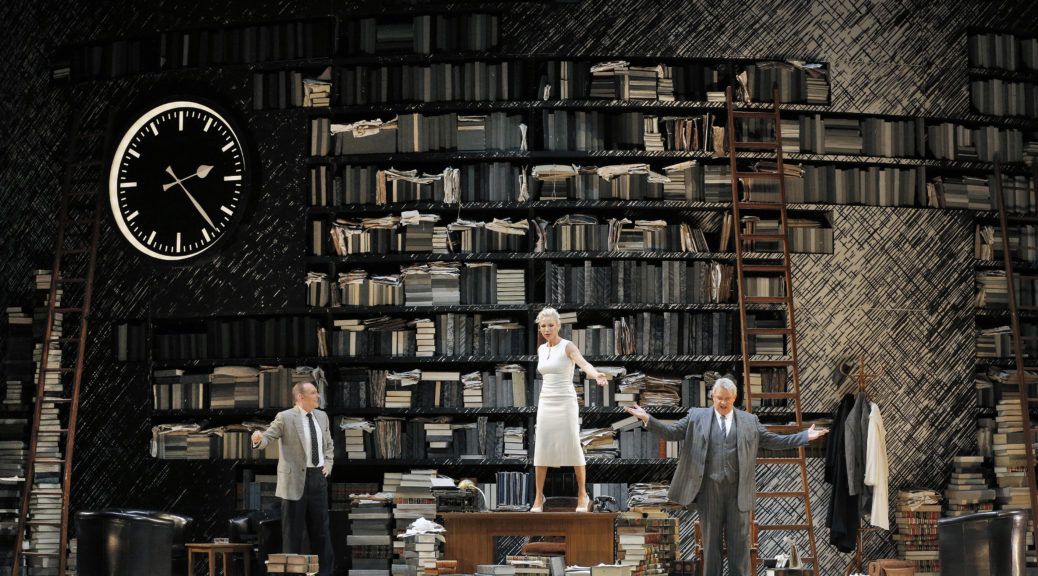
ETERNAL LIFE IS NOT UTOPIA
Can you shape a viable opera scenario out of law suits and legal offices?
Janacek’s answer was yes, if you thrust into the middle of the muddle a whirlwind femme fatale powering the drama and driving all the men mad as well.
Janacek’s improbable 1926 opera “The Makropulos Case” ties in an intriguing fable: Because of a longevity potion, the seemingly youthful lady is now 337 years old, remembering intimate details about relationships and documents established by people long since dead. Since very few of us could recall all this complex plot afterward, it matters little in the wake of the amoral lady, who lives life to the hilt but convinces us that eternal life isn’t worth a tinker’s dam, as the essential zest for life is petering out at last.
Her combination of outer allure and inner ennui is a fascination, brilliantly played by the nubile German dramatic soprano Nadja Michael. She sings the Czech texts while sprawled on the floor, springing like a cat, extending a leg like a slithering snake, even clambering up desks in high heels. The voice is of Wagnerian dimensions, one that has cast her into numerous roles of dramatic intensity, mostly intermediate between soprano and mezzo. Her ovations, implicitly for Stage Director Olivier Tambosi as well, were altogether deserved when heard Oct. 26 at the S.F. Opera. Her Emilia Marty is an incendiary figure as fascinating as other operatic noncomformists like Lulu and Elektra. Sung conversations dominate the opera until her swan-song aria at the final curtain.
Otherwise the story taken from a Capek play is an unlikely intellectual exercise about recovery of musty documents for a endless trial, all played out while various men with or without briefcases strive to marry her, take her to bed, or simply commit suicide out of frustration. To make the tale yet more convoluted, the lady has taken on multiple personae and nationalities over the years, with varied names, all of them having the initials E.M.
To this operaficionado, the highlight of “Makropulos” is the emphatic, unsettling and at times jarring music of Leos Janacek, the long-neglected nationalistic composer who never got a production outside his native Moravia until he was in his 60s. The late-blooming figure serves as a model for every senior citizen. Ultimately he created five operas still making the rounds around the world, 88 years after his death. The works sound like storms at sea, embodying great dramatic punch and bristling with conflicts within the ensemble, the brass first and foremost. Conductor Mikhail Tatarnikov spared nothing in conveying the tremors of the sonic messages, some of them recurrent themes in the two-hour opera.
Apart from Michael herself, the cast was routine, capped by tenor Charles Workman (Albert Gregor), abetted by the SFO veteran Dale Travis (as the attorney Kolenaty), Brenton Ryan (Janek) and Stephen Powell (Prus)—all of them so many puppets on the heroine’s chess board.
The sets by Frank Philipp Schloessmann were German-expressionistic, mostly stark bare walls, capped by an immense working clock reminding the heroine of the inexorable passage of time.
OPERA NOTES—-Amazingly, none of the 10 principals were native speakers of Czech, which is a challenging consonant-dominated Slavic tongue….This opera has a special place in the SFO’s heart, as the troupe had boldly given its American premiere 50 years ago…The fall season ends with “Aida” Dec. 6.
Janacek’s “The Makropulos Case” (1926), in Czech, at the S.F. Opera through Oct. 29. Opera House, S.F. For info: (415) 864-3330, or go online.
©Paul Hertelendy 2016
#
Paul Hertelendy has been covering the dance and modern-music scene in the San Francisco Bay Area with relish — and a certain amount of salsa — for years.
These critiques appearing weekly (or sometimes semi-weekly, but never weakly) will focus on dance and new musical creativity in performance, with forays into books (by authors of the region), theater and recordings by local artists as well.
#
Week of Oct. 28-Nov. 4, 2016
Vol. 19, No. 8